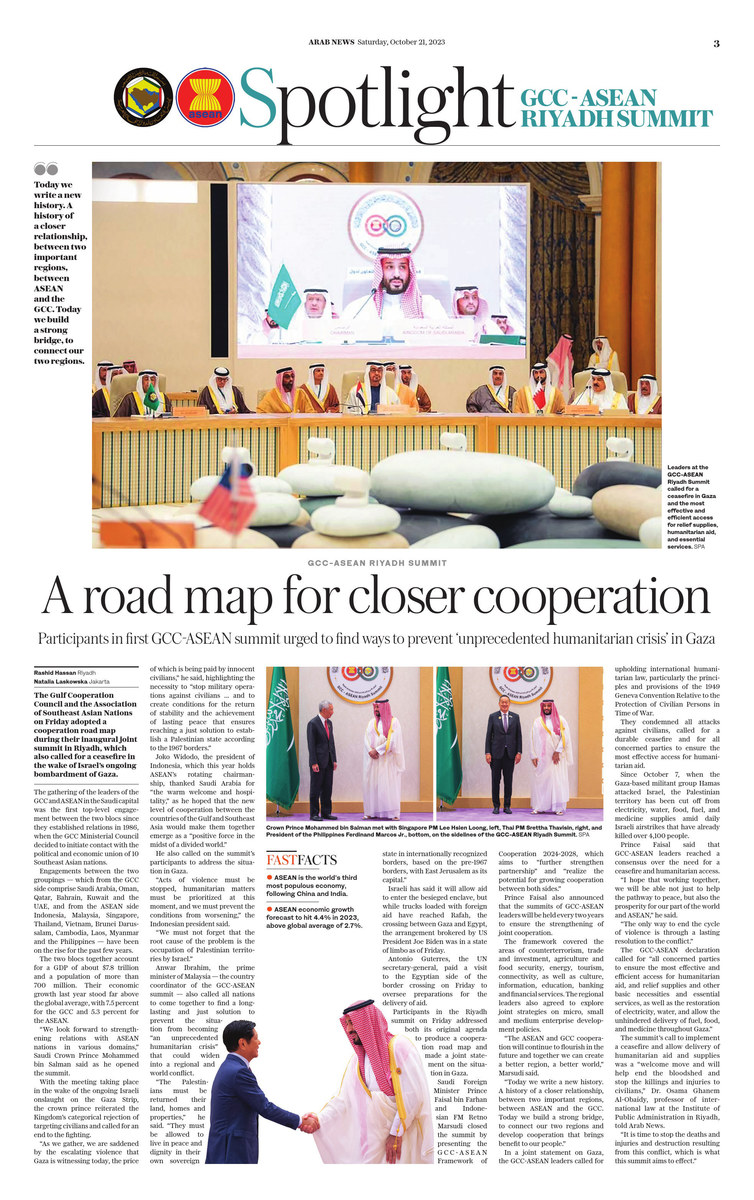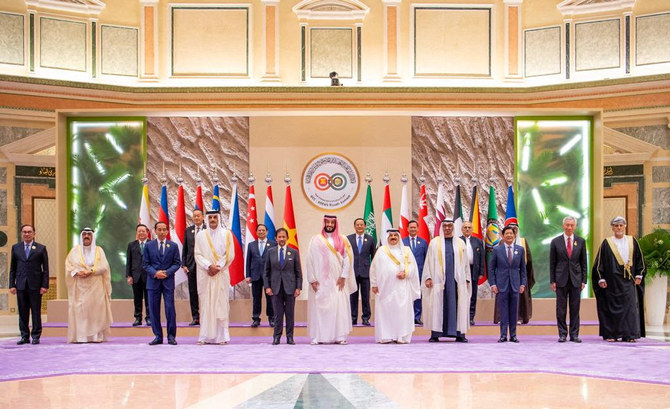RIYADH/JAKARTA: The Gulf Cooperation Council and the Association of Southeast Asian Nations adopted on Friday a cooperation road map during their inaugural joint summit in Riyadh, which also called for a ceasefire in the wake of Israel’s ongoing bombardment of Gaza.
The gathering of the leaders of the GCC and ASEAN in the Saudi capital was the first top-level engagement between the two blocs since they established relations in 1986, when the GCC Ministerial Council decided to initiate contact with the political and economic union of 10 Southeast Asian nations.
Engagements between the two groupings — which from the GCC side comprise Saudi Arabia, Oman, Qatar, Bahrain, Kuwait and the UAE, and from the ASEAN side Indonesia, Malaysia, Singapore, Thailand, Vietnam, Brunei Darussalam, Cambodia, Laos, Myanmar and the Philippines — have been on the rise for the past few years.
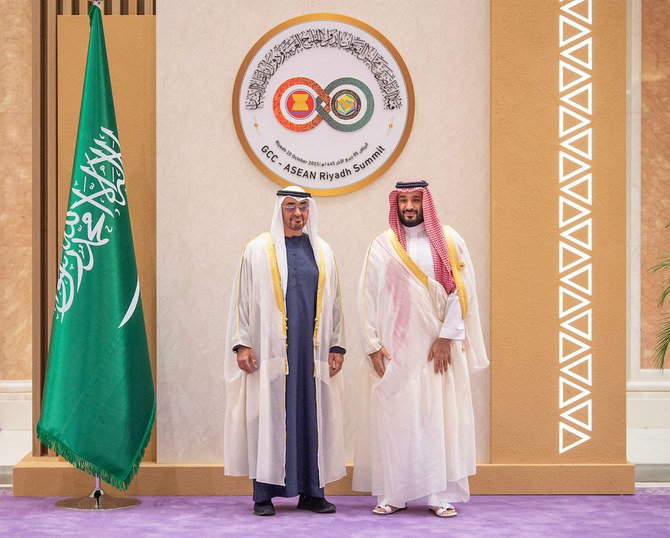
UAE President Sheikh Mohamed bin Zayed al-Nahyan (L) and Saudi Crown Prince Mohammed bin Salman welcome leaders from the ASEAN and GCC prior to the regional blocs’ maiden summit in Riyadh. (SPA)
The two blocs together account for a GDP of about $7.8 trillion and a population of more than 700 million. Their economic growth last year stood far above the global average, with 7.5 percent for the GCC and 5.3 percent for the ASEAN.
“We look forward to strengthening relations with ASEAN nations in various domains,” Saudi Crown Prince Mohammed bin Salman said as he opened the summit.
With the meeting taking place in the wake of the ongoing Israeli onslaught on the Gaza Strip, the crown prince reiterated the Kingdom’s categorical rejection of targeting civilians and called for an end to the fighting.
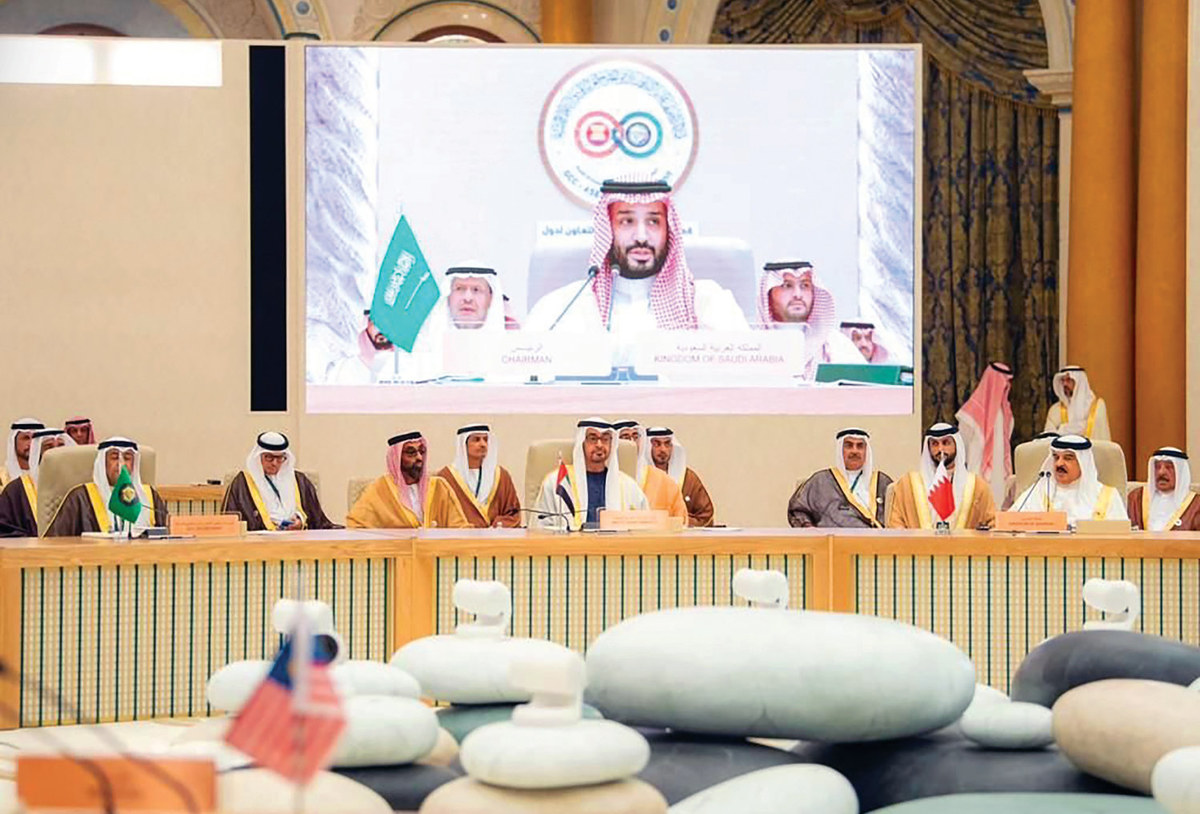
Leaders at the GCC-ASEAN Riyadh Summit called for a ceasefire in Gaza and the most effective and efficient access for relief supplies, humanitarian aid, and essential services. (SPA)
“As we gather, we are saddened by the escalating violence that Gaza is witnessing today, the price of which is being paid by innocent civilians,” he said, highlighting the necessity to “stop military operations against civilians ... and to create conditions for the return of stability and the achievement of lasting peace that ensures reaching a just solution to establish a Palestinian state according to the 1967 borders.”
Joko Widodo, the president of Indonesia, which this year holds ASEAN’s rotating chairmanship, thanked Saudi Arabia for “the warm welcome and hospitality,” as he hoped that the new level of cooperation between the countries of the Gulf and Southeast Asia would make them together emerge as a “positive force in the midst of a divided world.”
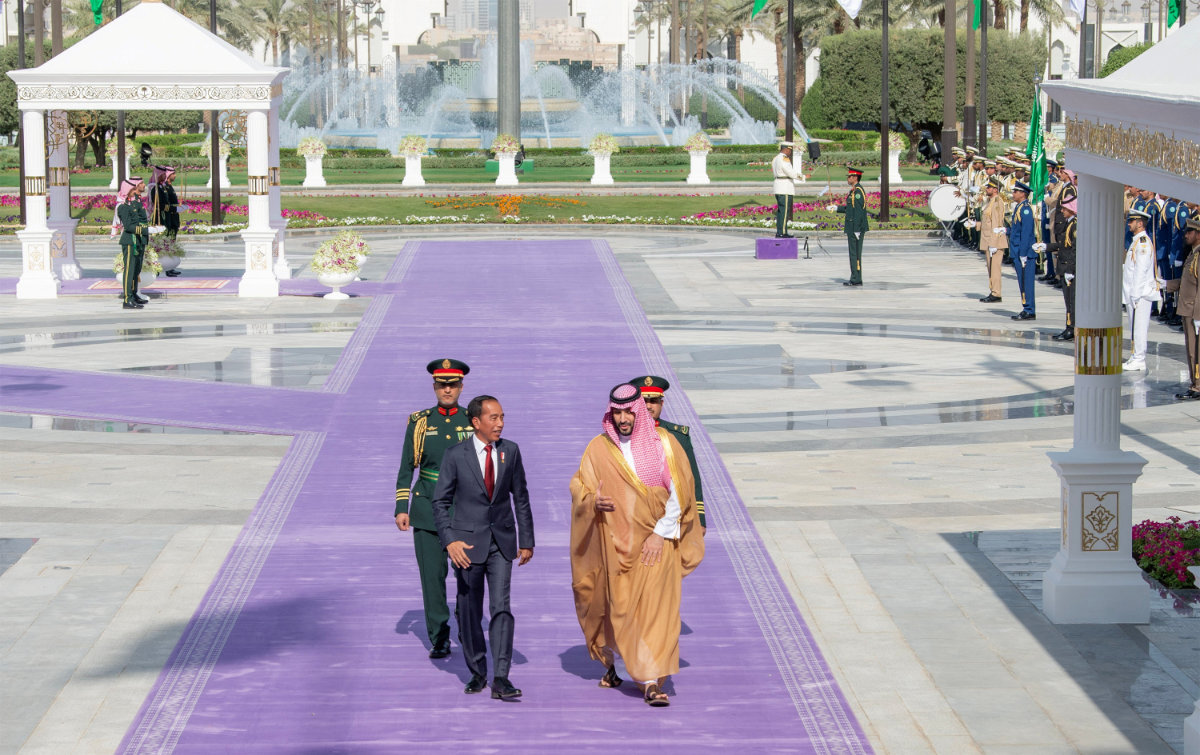
Saudi Crown Prince Mohammed bin Salman (R) welcomes Indonesian President Joko Widodo in Riyadh on October 19, 2023, a day ahead of the GCC-ASEAN summit. (Photo by Bandar Al-Jaloud/Saudi Royal Palace)
He also called on the summit’s participants to address the situation in Gaza.
“Acts of violence must be stopped, humanitarian matters must be prioritized at this moment, and we must prevent the conditions from worsening,” the Indonesian president said.
“We must not forget that the root cause of the problem is the occupation of Palestinian territories by Israel.”
INNUMBERS
ASEAN is the world’s third most populous economy, following China and India.
ASEAN economic growth projected to slow from 5.6% in 2022 to 4.4% in 2023.
The figure would still be above the global average of 2.7%.
Anwar Ibrahim, the prime minister of Malaysia — the country coordinator of the GCC-ASEAN summit — also called all nations to come together to find a long-lasting and just solution to prevent the situation from becoming “an unprecedented humanitarian crisis” that could widen into a regional and world conflict.
“The Palestinians must be returned their land, homes and properties,” he said. “They must be allowed to live in peace and dignity in their own sovereign state in internationally recognized borders, based on the pre-1967 borders, with East Jerusalem as its capital.”
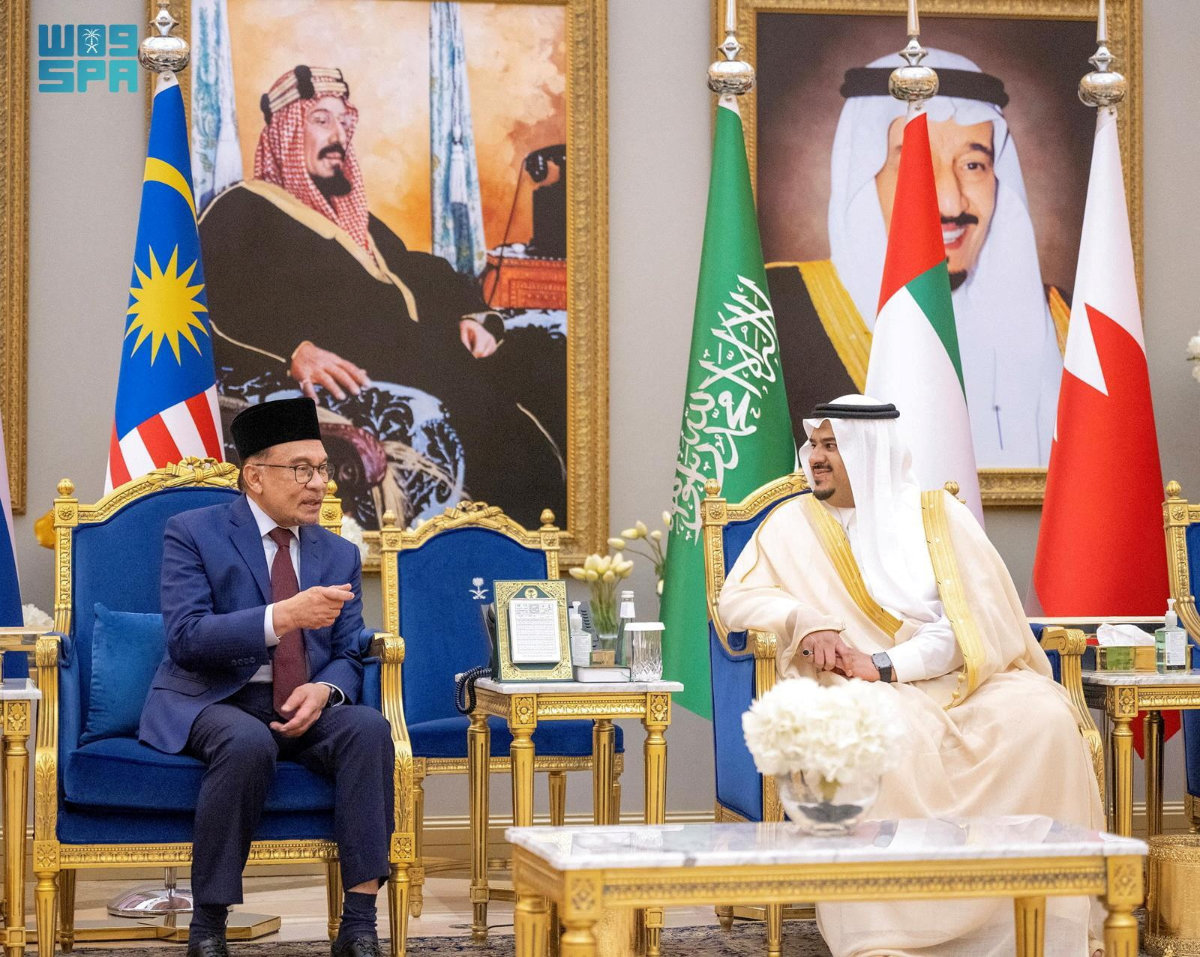
Malaysian Prime Minister Anwar Ibrahim (L), the country coordinator of the GCC-ASEAN summit, called all nations to come together to find a long-lasting and just solution to the Palestinian crisis. (SPA)
Israeli has said it will allow aid to enter the besieged enclave, but while trucks loaded with foreign aid have reached Rafah, the crossing between Gaza and Egypt, the arrangement brokered by US President Joe Biden has been in a state of limbo.
Participants in the Riyadh summit on Friday addressed both its original agenda to produce a cooperation road map and made a joint statement on the situation in Gaza.
Saudi Foreign Minister Prince Faisal bin Farhan and Indonesian FM Retno Marsudi closed the summit by presenting the GCC-ASEAN Framework of Cooperation 2024-2028, which aims to “further strengthen partnership” and “realize the potential for growing cooperation between both sides.”
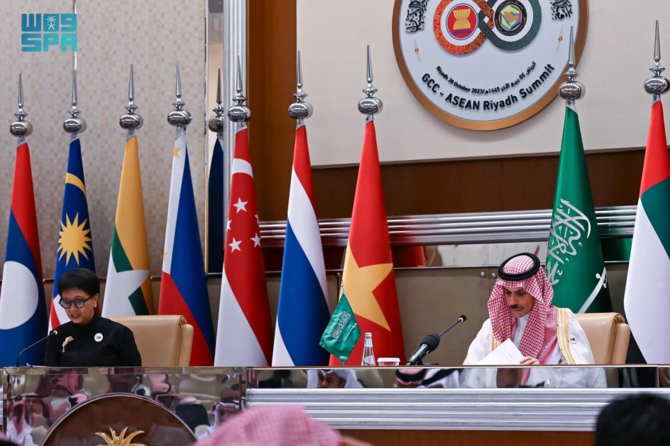
Saudi Arabia’s Foreign Minister Prince Faisal bin Farhan holds a joint press conference with his Indonesian counterpart Retno Marsudi. (SPA)
Prince Faisal also announced that the summits of GCC-ASEAN leaders will be held every two years to ensure the strengthening of joint cooperation.
The framework covered the areas of counterterrorism, trade and investment, agriculture and food security, energy, tourism, connectivity, as well as culture, information, education, banking and financial services. The regional leaders also agreed to explore joint strategies on micro, small and medium enterprise development policies.
“The ASEAN and GCC cooperation will continue to flourish in the future and together we can create a better region, a better world,” Marsudi said.
“Today we write a new history. A history of a closer relationship between two important regions, between ASEAN and the GCC. Today we build a strong bridge, to connect our two regions and develop cooperation that brings benefit to our people.”
In a joint statement on Gaza, the GCC-ASEAN leaders called for upholding international humanitarian law, particularly the principles and provisions of the 1949 Geneva Convention Relative to the Protection of Civilian Persons in Time of War.

They condemned all attacks against civilians, called for a durable ceasefire and for all concerned parties to ensure the most effective access for humanitarian aid.
Since October 7, when the Gaza-based militant group Hamas attacked Israel, the Palestinian territory has been cut off from electricity, water, food, fuel, and medicine supplies amid daily Israeli airstrikes that have already killed over 4,100 people.
Prince Faisal said that GCC-ASEAN leaders reached a consensus over the need for a ceasefire and humanitarian access.
“I hope that working together, we will be able not just to help the pathway to peace, but also the prosperity for our part of the world and ASEAN,” he said.
“The only way to end the cycle of violence is through a lasting resolution to the conflict.”
The GCC-ASEAN declaration called for “all concerned parties to ensure the most effective and efficient access for humanitarian aid, and relief supplies and other basic necessities and essential services, as well as the restoration of electricity, water, and allow the unhindered delivery of fuel, food, and medicine throughout Gaza.”
The summit’s call to implement a ceasefire and allow delivery of humanitarian aid and supplies was a “welcome move and will help end the bloodshed and stop the killings and injuries to civilians,” Dr. Osama Ghanem Al-Obaidy, professor of international law at the Institute of Public Administration in Riyadh, told Arab News.
“It is time to stop the deaths and injuries and destruction resulting from this conflict, which is what this summit aims to effect.”
